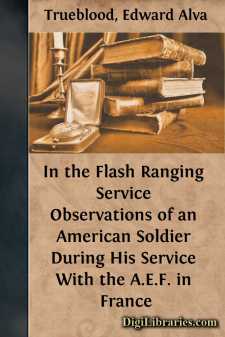Categories
- Antiques & Collectibles 13
- Architecture 36
- Art 48
- Bibles 22
- Biography & Autobiography 813
- Body, Mind & Spirit 142
- Business & Economics 28
- Children's Books 14
- Children's Fiction 11
- Computers 4
- Cooking 94
- Crafts & Hobbies 4
- Drama 346
- Education 46
- Family & Relationships 57
- Fiction 11829
- Games 19
- Gardening 17
- Health & Fitness 34
- History 1377
- House & Home 1
- Humor 147
- Juvenile Fiction 1873
- Juvenile Nonfiction 202
- Language Arts & Disciplines 88
- Law 16
- Literary Collections 686
- Literary Criticism 179
- Mathematics 13
- Medical 41
- Music 40
- Nature 179
- Non-Classifiable 1768
- Performing Arts 7
- Periodicals 1453
- Philosophy 64
- Photography 2
- Poetry 896
- Political Science 203
- Psychology 42
- Reference 154
- Religion 513
- Science 126
- Self-Help 84
- Social Science 81
- Sports & Recreation 34
- Study Aids 3
- Technology & Engineering 59
- Transportation 23
- Travel 463
- True Crime 29
In the Flash Ranging Service Observations of an American Soldier During His Service With the A.E.F. in France
Categories:
Description:
Excerpt
Chapter I.
When the sun arose on the 22nd of June, 1918, three great transports were lying out in the stream of New York harbor. They were filled with American soldiers for duties overseas. They were well camouflaged and well convoyed. The previous afternoon they had pulled away from a Jersey City pier, where they had taken on their human cargoes, and they were undoubtedly under sealed orders. They had slipped away quietly from the piers without attracting undue attention, and while they moved to the location where they anchored for the night, not a soldier's uniform could have been detected from shore even after the most scrutinizing search with the best binoculars obtainable. The departure was made without a word of warning and not a fond good-bye. It was accomplished with a methodical silence that called for admiration. It is the way Uncle Sam does things during war times.
Just before 9 o'clock on that beautiful June morning, simultaneously but without communicating with each other, each of those transports began to weigh anchor, and except for the click, click, click of the machinery all was silent. Precisely at 9:05, without the blast of a whistle, the sound of a gong, or the hoisting of a signal flag on the mast, but like so many automatic machines, these vessels turned their prows to the sea and began their long voyage.
Among those who sailed on one of the vessels of this transport fleet were the members of the Twenty-ninth Engineers, A. E. F., of which I was a member, being attached to Company C. Our departure was an occasion never to be forgotten.
As we glided out of the great harbor and saw first the Statue of Liberty, then all trace of our native land disappear from sight, and we realized that we were on our way to fight the most savage, inhuman and despicable foe that has ever drawn a lance, a feeling of solemn thoughtfulness came over most of the boys. Many of them were so affected, as they knew a certain percentage of us must inevitably fall in battle, that they went below to spend a few hours by themselves in serious thought. I am not ashamed to say that I was one of those who sought solace for my feelings in thoughtful solitude.
The vessel upon which we sailed was an Italian transport, by name, the "King of Italy." It was accompanied by a French and a former German liner and was convoyed by a destroyer and a cruiser. On the second day out we picked up four more transports, making seven in all in our fleet.
There were 1,500 American soldiers on our transport and approximately the same on four of the other transports. Two of them, however, carried more than 3,500 men, making a total of about 15,000 men on that one fleet bound for duty overseas. Of the 1,500 men on the King of Italy, 500 were white and 1,000 colored troops. No trouble was caused by this mixture of races because of good management. The white and colored boys were kept on different parts of the boat and all guard duty was in the hands of the white troops.
For the first few hours after sailing, thoughts of home lingered in the minds of most of the boys, but these were hastily banished when we had our first life drill....


